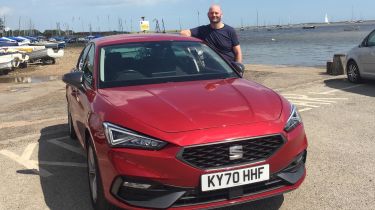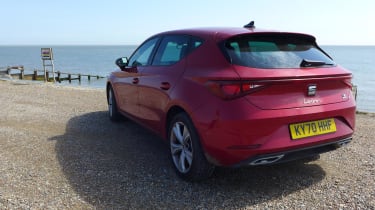SEAT Leon e-Hybrid FR: Living with it
How does plug-in hybrid ownership work without a home wallbox charger? We're running a SEAT Leon e-Hybrid to find out...
| On fleet since: | February 2021 |
|---|---|
| List price new: | £32,835 |
| Options: | Charging cable (£145) |
| Mileage to date: | 4,303 |
| Efficiency to date: | 42.6mpg |
| Problems? | None so far |
Report 1: Introducing our SEAT Leon e-Hybrid
Plug-in hybrids are often touted as offering "the best of both worlds": zero-emissions electric driving for short, routine local journeys and a combustion engine for longer runs without worrying about charging en route. That's all well and good, but what if you don't have a driveway and can't get a home wallbox charger fitted? That was the big question at the start of my time running the plug-in version of the SEAT Leon family hatchback.
Living in a 1930s semi-detached house in London, I do without the driveway that many of my suburban and rural-based colleagues take for granted. The front door is close enough to the street to run a three-pin cable out to the car, but charging this way is very slow and leaving the door open in colder weather is a bit of a non-starter.
As regards public charging points, none of my regular supermarkets nearby have one yet. The nearest one that does is a 10-mile round trip away, so I'd be using up a significant proportion of the Leon's claimed 40-mile electric range just getting back home from charging it. And based on what I've seen on the occasions when I have been able to charge the car, that number is optimistic to say the least. Low to mid-20s seems to be the norm, and even less in very cold weather.
So I can see how private buyers – particularly those without easy access to a charging point – may be sceptical about paying more for a plug-in Leon than a regular petrol or diesel one. For company-car users, it's a different story, though: the Leon's 27g/km CO2 emissions put it in the 7% Benefit-in-Kind (BiK) band, so a lower-rate taxpayer will hand over just £459 a year to run one, compared to very nearly £2,000 for a similarly powerful 2.0-litre diesel Leon.
The Leon is a reasonably efficient car even if you can't charge it very often, thanks in part to its regenerative braking, which keeps some energy going through the battery regardless of whether you can plug it in or not. I've seen average fuel economy of over 42mpg so far, which is pretty impressive for a powerful turbocharged petrol engine.
This is a good car to drive, too: a trip to the Peak District highlighted both the Leon's comfort and composure on the motorway when filled with family and luggage, and its ability to entertain on a great driving road – in this case, the A537 to Buxton. Nice scenery and the car's confidence-inspiring surefootedness in drizzly conditions made for an enjoyable time at the wheel.
Less satisfactory is SEAT's almost entirely touchscreen-based infotainment system. It didn't recognise the postcode of our remote rural holiday accommodation, so we had to rely on Google Maps over Apple CarPlay to take us there. And the almost complete lack of physical controls mean nearly every function has to be carried out by flicking through sub-menus – not really an option when you're on the move.
The heater adjuster is particularly frustrating: it seems to either fail to respond altogether, or suddenly jump to a much higher temperature than I'm trying to set. I find systems in rival cars – the Mercedes MBUX setup in the A-Class, for example – to be much better.
Despite these niggles, however, I'm broadly impressed with the Leon. It's a good-looking, fun-to-drive, practical and pretty efficient family hatchback, and I can see how it would fit very well into the lifestyle of someone who could charge it every evening at home.




